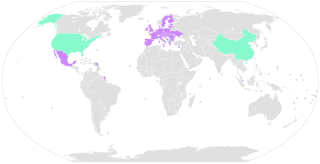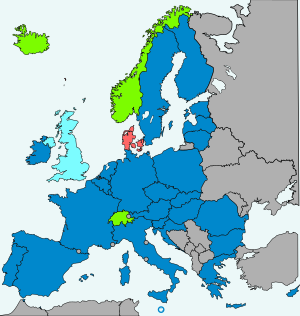Jurisdiction is the legal term for the legal authority granted to a legal entity to enact justice. In federations like the United States, the concept of jurisdiction applies at multiple levels.
Conflict of laws is the set of rules or laws a jurisdiction applies to a case, transaction, or other occurrence that has connections to more than one jurisdiction. This body of law deals with three broad topics: jurisdiction, rules regarding when it is appropriate for a court to hear such a case; foreign judgments, dealing with the rules by which a court in one jurisdiction mandates compliance with a ruling of a court in another jurisdiction; and choice of law, which addresses the question of which substantive laws will be applied in such a case. These issues can arise in any private-law context, but they are especially prevalent in contract law and tort law.
The draft European Patent Litigation Agreement (EPLA), or formally the Draft Agreement on the establishment of a European patent litigation system, was a proposed patent law agreement aimed at creating an "optional protocol to the European Patent Convention (EPC) which would commit its signatory states to an integrated judicial system, including uniform rules of procedure and a common appeal court". It differed from the Unified Patent Court Agreement in that the EPLA negotiations were coordinated from the side of the European Patent Office, rather than from the European Council and Commission and therefore also offered the possibility for non-EU states to participate.
In law, the enforcement of foreign judgments is the recognition and enforcement in one jurisdiction of judgments rendered in another ("foreign") jurisdiction. Foreign judgments may be recognized based on bilateral or multilateral treaties or understandings, or unilaterally without an express international agreement.
In modern society, the role of marriage and its termination through divorce have become political issues. As people live increasingly mobile lives, the conflict of laws and its choice of law rules are highly relevant to determine:

The Civil Jurisdiction and Judgments Act 1982 (c.27) is an Act of the Parliament of the United Kingdom, which was passed to implement the Brussels Convention of 1968 into British law. As well as governing whether the Courts of England and Wales, Northern Ireland and Scotland have jurisdiction to hear cases against defendants in other contracting states, the Act provided a statutory basis for the division of jurisdiction between the three jurisdictions within the UK. No provision was made in 1982 for division of jurisdiction between the UK and Gibraltar; this was rectified by the Civil Jurisdiction and Judgments Act 1982 (Gibraltar) Order 1997 which stated that, for the purposes of the 1982 Act, Gibraltar should be treated as a separate contracting state.

The Service Regulation, officially the Council Regulation (EC) No. 1393/2007 on the service in the Member States of judicial and extrajudicial documents in civil or commercial matters, is a European Union regulation in the field of judicial cooperation. It allows service of judicial documents from one member state to another without recourse to consular and diplomatic channels.
The principle of lis alibi pendens applies in municipal law, public international law, and private international law to address the problem of potentially contradictory judgments. If two courts were to hear the same dispute, it is possible they would reach inconsistent decisions. To avoid the problem, there are two rules.
In European Union law, and especially in European intellectual property law, a cross-border injunction is an injunction by a court in one European country, such as for example a court in the Netherlands forbidding infringement in several other European countries.
A preliminary ruling is a decision of the European Court of Justice (ECJ) on the interpretation of European Union law that is given in response to a request from a court or a tribunal of a member state. A preliminary ruling is a final determination of European Union law, with no scope for appeal. The ECJ hands down its decision to the referring court, which is then obliged to implement the ruling.

Justice Jean-Paul Beraudo is a lawyer, academic and author of legal works. He was Justice at the French Supreme Court and vice-chairman of the International Court of Arbitration. He lectures on International Private Law and International Trade Law at Panthéon-Sorbonne University and on Company law at Sciences-Po, Paris. The International Institute for the Unification of Private Law (UNIDROIT) appointed him correspondent for France and a member of the scientific committee.

Brussels II Regulation (EC) No 1347/2000, which came into force on 1 March 2001, sets out a system for the allocation of jurisdiction and the reciprocal enforcement of judgments between European Union Member States and was modelled on the 1968 Brussels Convention on Jurisdiction and the Enforcement of Judgments in Civil and Commercial Matters. It was intended to regulate domains that were excluded from the Brussels Convention and Brussels I. The Brussels II Regulation deals with conflict of law issues in family law between member states; in particular those related to divorce and child custody. The Regulation seeks to facilitate free movement of divorce and related judgments between Member States.
A Minute of Agreement is a legal procedure available in Scotland. It is a document drawn up between two or more parties in the presence of their solicitors, without the need for formal court action. In its usual format, it will contain numbered paragraphs that record formal but legally binding provisions by which each party has agreed to be bound. If it contains any provision which is enforceable in Scotland, it can be registered in other parts of the United Kingdom for recognition and enforcement. A Minute of Agreement can also be registered for recognition and enforcement in EU Member States or non-EU European Free Trade Association (EFTA) countries. A separate arrangement applies to Gibraltar. A foreign equivalent may also be known as an Authentic Instrument.

The Maintenance Regulation (EC) No 4/2009, formally the Council Regulation (EC) on jurisdiction, applicable law, recognition and enforcement of decisions and cooperation in matters relating to maintenance obligations, is a European Union Regulation on conflict of law issues regarding maintenance obligations. The regulation governs which courts have jurisdiction and which law it should apply. It further governs the recognition and enforcement of decisions. The regulation amends the Brussels Regulation, which covers jurisdiction in legal disputes of a civil or commercial nature between individuals more broadly.

The Hague choice of court convention, formally the Convention of 30 June 2005 on Choice of Court Agreements, is an international treaty concluded within the Hague Conference on Private International Law. It was concluded in 2005, and entered into force on 1 October 2015. The European Union, Denmark, Mexico, Moldova, Montenegro, Singapore, Ukraine and the United Kingdom are parties to the convention. Albania, China, Israel, North Macedonia and the United States signed the convention, but did not ratify.

The Brussels I Regulation (EU) 1215/2012 contains a jurisdictional regime: the rules which courts of European Union Member States use to determine if they have jurisdiction in cases with links to more than one country in the European Union. The basic principle is that the court in the member state of the party that gets sued has jurisdiction, while other grounds exist, which are diverse in content and scope, and are often classified in descending order of exclusivity and specificity. The original Brussels Regulation (44/2001) is, with regard to jurisdiction rules, very similar to the 2007 Lugano Convention, containing the same provisions with the same numbering. Numbering and certain substantial issues are different in the 2012 recast version of the Regulation, which has applied since 1 January 2015 (1215/2012).
Gasser v MISAT (C–116/02) was a decision of the European Court of Justice regarding the interpretation of the Brussels convention of 1968 ruling that a court chosen in a choice of court agreement should stay its proceedings - as any other court chosen second within the Brussels regime - until the court first seized had declared it did not have jurisdiction. The court's decision was considered problematic as it favoured the uniformity of application of the Brussels regime jurisdictional rules temporarily over party autonomy. Due to similar provisions in the 2001 Brussels Regulation and Lugano Conventions, the interpretation also affects choice of court agreements under those later instruments. However, in the 2012 Recast version of the Brussels I Regulation chosen courts can take jurisdiction, even if a court not chosen has been addressed first.

The Treaties of the European Union are a set of international treaties between the European Union (EU) member states which sets out the EU's constitutional basis. They establish the various EU institutions together with their remit, procedures and objectives. The EU can only act within the competences granted to it through these treaties and amendment to the treaties requires the agreement and ratification of every single signatory.

The Hague Judgments Convention, formally the Convention of 2 July 2019 on the Recognition and Enforcement of Foreign Judgments in Civil or Commercial Matters is an international treaty concluded within the Hague Conference on Private International Law. It was concluded in 2019, and entered into force on 1 September 2023 for the European Union and Ukraine. The convention governs the recognition of judgements in civil and commercial matters.
Real Madrid Club de Fútbol, AE v EE, Société Éditrice du Monde SA is an ongoing case of the European Court of Justice (ECJ). The case, brought by the Spanish football club Real Madrid, alleges that French newspaper Le Monde defamed the club by publishing an article linking the club to a doctor known for doping. Although Spanish courts have awarded the football club damages, French courts have refused to uphold their judgment in the name of protecting freedom of the press. The French courts have sent a request for a preliminary ruling from the ECJ on whether the principle of mutual recognition of judgments outweighs the freedom of the press and freedom of expression. The ECJ will seek to reconcile the decisions of two national courts and determine the role of rights within the principle of mutual recognition.









